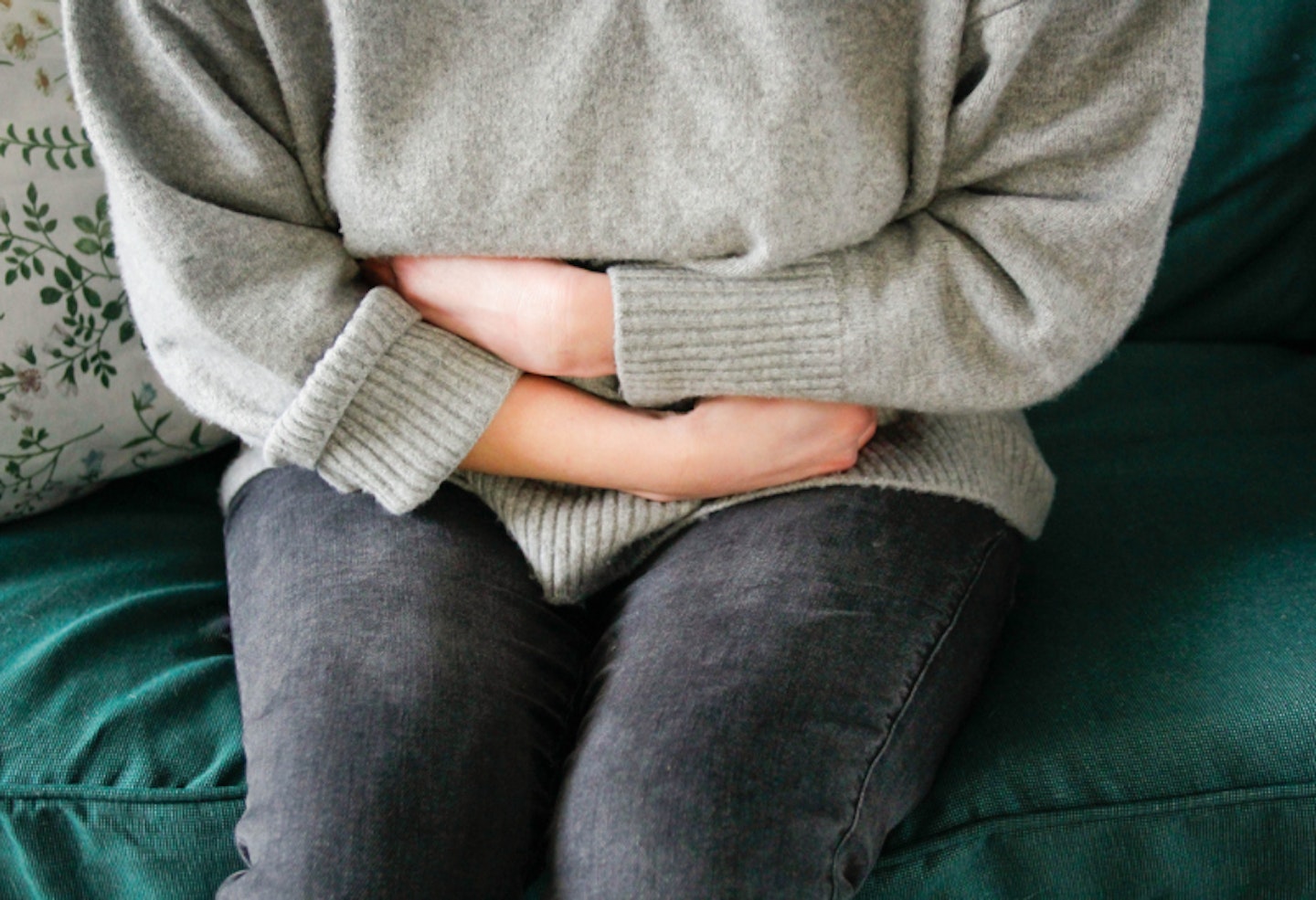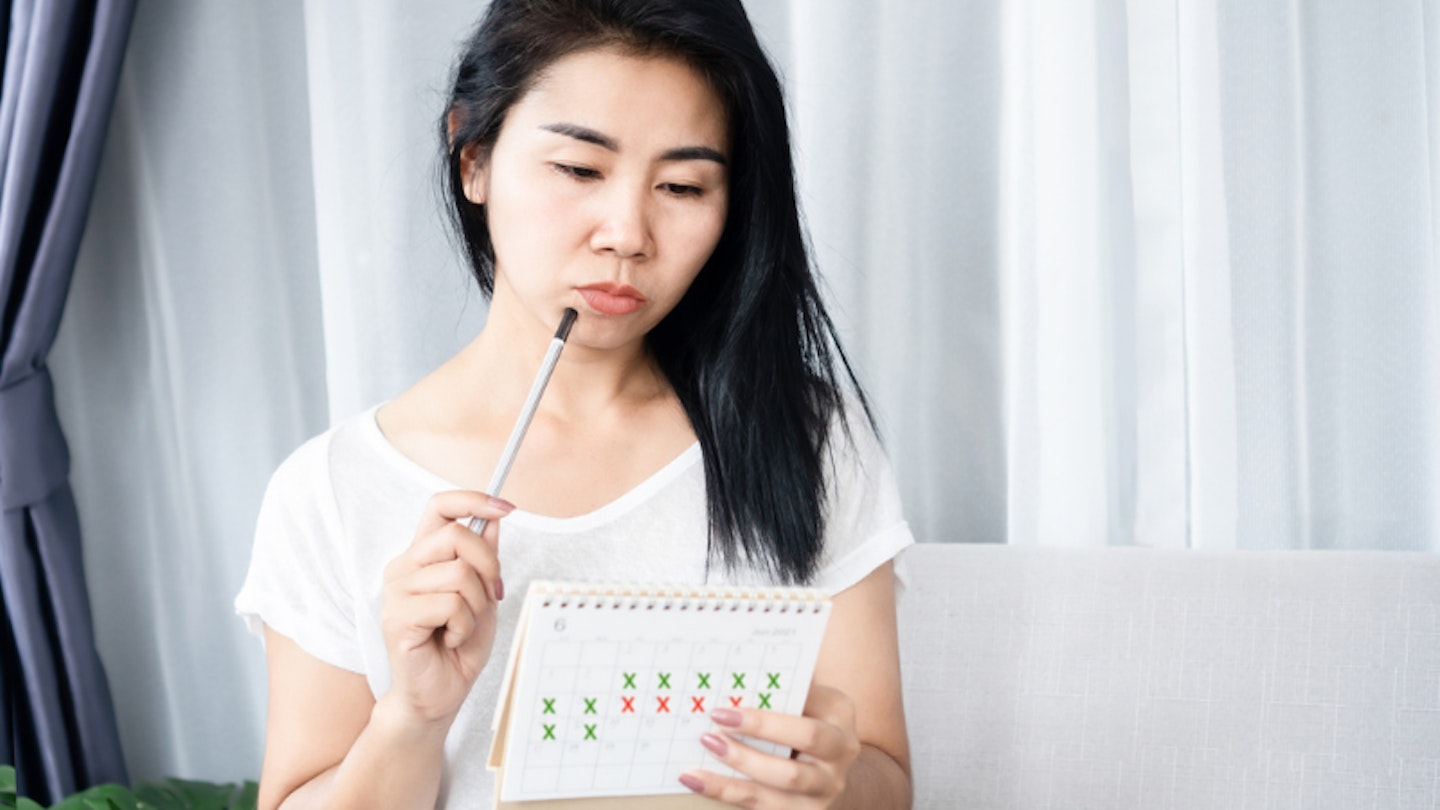Whether you are trying for a baby, have just given birth, or are perimenopausal, it can be worrying if you have irregular periods. Whatever your time of life, you will question what is causing an irregular menstrual cycle, and you will want to know what to do about it.
Dr. Shazia Malik, Consultant OBGYN comments: "Some of the main causes of irregular periods include the body adjusting to hormonal changes, delayed return of ovulation after hormonal contraception, and conditions such as polycystic ovary syndrome (PCOS), thyroid disorders, pregnancy, stress, extreme workouts or diets low in caloric intake."
If you are worried about your periods, or think they are irregular, then read on to find out about what causes irregular periods and what you should do about them.

What is an irregular period?
Everyone's periods are different and you know what is normal for you, and what might be considered irregular. Mr Hemant Vakharia, consultant gynaecologist and advanced laparoscopic surgeon at London Gynaecology, says: "When it comes to menstrual cycles, every woman's experience can be a bit different. It's normal for the time between the start of one period and the next (we call this the cycle length) to vary from 21 to 42 days."
However, when thinking about the symptoms of irregular periods, there are a few factors which will define your periods as irregular.
•The number of days between your period: If this keeps changing and is consistently different it can mean you have irregular periods.
•Amount of menstrual blood: If the amount of menstrual blood changes during each period you might have irregular periods.
•Periods are closer together: This is when there is less than 25 days from the start of one period to the next.
•Periods are further apart: There is longer than 35 days between the start of one period and the next.
The NHS says that a woman's periods are irregular if the gap between them is less than 21 days or more than 35 days. It is more likely you will suffer from irregular periods when you have just started menstruating during puberty. Mr Hemant Vakharia says: "It's pretty common for periods to be irregular, especially during your teenage years. This is because ovulation (when an egg is released from the ovary) isn't happening on a regular schedule yet. It usually takes until your early 20s for things to settle down and for your periods to find a regular rhythm." However, there are many factors that affect your periods and they can become irregular at any stage of your life.
It is advisable to keep track of your periods and you can do this by writing it down, or there are many different apps to track your menstrual cycle as well. Day 1 of your menstrual cycle is the first day of your period and the last day of your cycle is the day before your next period. It will make it easier for a GP to understand your cycle if you have kept a track of it.

Causes of irregular periods
Your periods will change throughout your life and this can be dependant on many things including age, hormones, medication, pregnancy, breastfeeding and any health conditions. You will know what is normal for you but if you have any concerns you should always check with a doctor. However, while irregular periods are common, there are a range of factors which can affect, or cause them.
Birth control: Dr. Malik says: "It is normal for periods to be irregular for one to three months after stopping birth control, and they may return to normal after a few weeks or months. If you have been on hormonal birth control for a long time, then it may take a bit longer. Do go and see your doctor if it's been six months."
Giving birth: Irregular periods after giving birth are quite normal. Dr. Chandni Rajani, a GP and Aesthetic Doctor, says: "It is common to have irregular periods for the first few months after childbirth and during breastfeeding, sometimes taking up to a year to regulate. During pregnancy and childbirth, your body undergoes significant hormonal changes and requires time to return to its pre-pregnancy state."
Breastfeeding: Mr Hemant Vakharia advises: "Breastfeeding increases the production of prolactin, a hormone responsible for milk production. Prolactin also has the effect of suppressing ovulation, which can lead to irregular or absent periods. The more frequently and exclusively a mother breastfeeds (including night feeds), the higher the levels of prolactin, and the more likely it is that her periods will be delayed or irregular. Because prolactin suppresses ovulation, the menstrual cycle, which is regulated by ovulation, can become irregular. Some breastfeeding mothers may not ovulate for weeks or even months after delivery, while others may begin ovulating before their first postpartum period which is why some couples get caught out and fall pregnant. Breastfeeding demands extra energy from the mother's body, which can sometimes affect the body's readiness to resume regular menstrual cycles. The body may prioritise milk production over reproductive functions, leading to irregular periods."
Miscarriage: Dr. Chandni Rajani says: "Miscarriage can disrupt the menstrual cycle due to hormonal imbalances and emotional stress. Stress can also cause erratic and inconsistent menstrual cycles. If you're experiencing irregular periods post-birth or miscarriage, it's crucial to consult your GP for a treatment plan as well as support. They can assess the underlying cause and offer appropriate guidance to address your needs. Support, especially after a miscarriage is crucial in the healing process, and it is of the utmost importance to seek this out and take your time in this journey."
Perimenopause: Dr. Tiffany Pham, OB GYN and Medical Advisor for Flo Health, comments: "Perimenopause can cause irregular periods due to the absence of ovulation that can occur from time to time. Anovulation, or the lack of ovulation that occurs during perimenopause and the menopausal transition is due to the lower number of eggs that we have remaining in the ovary as we reach menopause. The closer we get to menopause, the less and less eggs we have left in our ovary to be ovulated. Ovulation is the process by which your ovaries produce a mature egg to be fertilized by the sperm. Ovulation will result in a period if the egg is not fertilized, therefore, when ovulation does not occur regularly, like in the case of perimenopause, you also end up with irregular periods. "
Health conditions: There are a few health conditions which can cause irregular periods such as PCOS, endometriosis or an underachieve thyroid. Dr Samantha Wild, clinical lead for women's health and a GP with Bupa, says: "If you have endometriosis, you might have irregular periods, and abnormal cramping before and during your menstrual cycle. This is because tissue, that should be in your uterus grows where it shouldn’t, and attaches to your ovaries or fallopian tubes."
Other factors: These include stress and anxiety, too much exercise, or losing or gaining weight.
When to see your doctor for irregular periods and how to treat them
The NHS recommends you speak to a doctor if you think your periods are irregular or they last for more than seven days. It is also advisable to consult your doctor if you have other symptoms such as weight gain, tiredness, dry or oily skin, or hair growth on your face because these might be linked to a condition such as [PCOS {href='https://www.motherandbaby.com/getting-pregnant/fertility/pcos/' }). Dr Samantha Wild says: "A symptom of polycystic ovary syndrome (PCOS) is having irregular periods, or no periods. When periods are irregular, they may last longer than a typical period length, or only happen either or fewer times a year. These irregularities are caused by your ovaries making large amounts of a “male” hormone called androgens, that can prevent or delay when you ovulate. Treatment from a health professional is important to help prevent any long-term complications. With treatment, your periods may return."
Treatment is not always needed, however, a GP may refer you to a specialist for further tests if they think they are needed, or if your irregular periods are caused by another health condition. Sometimes the contraceptive pill is prescribed to regulate periods, in particular the combined pill. Dr Samantha Wild, comments:
"Treatments for menstrual irregularities can vary, depending on their cause. However, these are some common treatments:
-
Lifestyle changes: Maintaining a healthy weight, reducing stress, and avoiding excessive exercise can help regulate menstrual cycles.
-
Contraceptives: Using oral hormone contraceptives may help to bring regularity back to your periods.
-
Surgery: In some cases, underlying issues such as polyps or uterine fibroids may lead to irregular bleeding. If this is the case, your GP may recommend surgery to correct these issues."
Irregular periods and fertility
It can sometimes be harder to get pregnant if you have irregular periods because you might not be releasing an egg regularly. Dr. Tiffany Pham, advises: "Irregular periods can affect your fertility because it may be the result of anovulation, or the lack of ovulation. If you are trying to conceive and have noticed that your periods are irregular (periods occur less than 21 days or more than 35 days apart, you skip periods for 3 months or more at a time etc), it is important to consult with your medical provider to find out the cause of the irregular periods so that you increase your chances of fertility."
Having sex every 2 to 3 days throughout your cycle can help, but if you are struggling to conceive, and have irregular periods, then you should speak to your doctor about hormone medicine or fertility treatment. It is also a good idea to track your periods and using an ovulation app can be helpful.
Signs of pregnancy when you have irregular periods
If you have irregular periods it might not be as easy to notice when you miss one because typically a late period is the first sign we look for. This can make it hard to know to take a pregnancy test, but there are other pregnancy symptoms which might make you suspect you are pregnant. It is good to be aware of all the signs of pregnancy to look for especially when you have irregular periods.
•Tiredness
•Bloating
•Nausea or sickness
•Light spotting
•Sore or swollen breasts
•Increased urination
•A change in your mood

The effects of irregular periods on the body
Irregular periods are very common among women of reproductive age, and irregular periods in teens just after puberty and older women approaching menopause is even more common. However, prolonged irregular bleeding can have some side effects. You may find that your periods are longer, heavier or more painful when they are irregular, and if you are trying for a baby irregular periods might make it more difficult to conceive. Some studies have suggested that there is link to more serious diseases such as heart disease and diabetes, but this is rare.
It is important to be aware of your cycle and if there are any abnormalities, such as more intense period cramps, a change in bleeding, or a longer cycle, or you have concerns about your periods, including how regular they are, then you should get it checked by your doctor.
About the experts
Dr.ShaziaMalik gained her medical degree in Obstetrics and Gynaecology in 1991. She has trained in Obstetrics in some of the largest tertiary level units in the country - her specialist training was undertaken in Cambridge, where she was also a research fellow funded by the MRC with a world-famous team looking at abnormal vessel function in women with excessively heavy periods or endometriosis.
Dr Chandni Rajani MBBS BSc (Hons) MRCA MRCGP, is a highly skilled Aesthetic Doctor and General Practitioner based in London, specialising in Women’s health and wellness.
Dr. Samantha Wild, is the clinical lead for women's health and a GP with Bupa. She has a particular interest in women’s health, paediatrics, and safeguarding, and is passionate about shifting the stigma surrounding many female health related subjects.
Dr. Tiffany Pham is a board-certified obstetrician and gynaecologist and medical advisor for Flo Health, based in Houston, Texas. Pham is passionate about helping women get access to necessary health services and medically-accurate health information and better understand their bodies.
Mr Hemant Vakharia is a Consultant Gynaecologist and advanced laparoscopic surgeon at London Gynaecology. He has additional training in the minimal access management of many gynaecological conditions which include endometriosis, ovarian cysts, fibroids, heavy menstrual bleeding and he manages these on a regular basis in his NHS practice.
Laura Healy is a Commercial Content Writer for Mother&Baby. She is a mum-of-two girls and loves writing about all things parenting, she is particularly interested in the toddler years and eco-friendly baby products, as well as children’s literature. She has a PhD in Creative Writing and has published short stories in the UK and Ireland, as well as previously writing freelance for her local paper.
